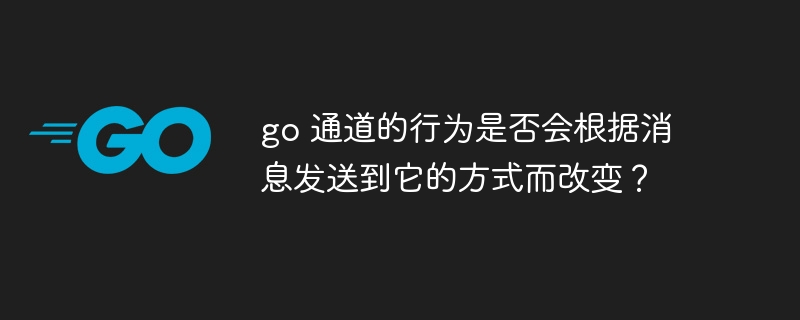 Backend Development
Backend Development
 Golang
Golang
 Does the behavior of a go channel change depending on how messages are sent to it?
Does the behavior of a go channel change depending on how messages are sent to it?
Does the behavior of a go channel change depending on how messages are sent to it?

php editor Xiaoxin In the go language, a channel is a mechanism used to transfer data between goroutines. The behavior of a channel depends on how messages are sent to it. When a channel is declared buffered, the goroutine sending the message will put the message into the channel's buffer and then continue execution. When the channel is declared unbuffered, the goroutine sending the message will block until other goroutine receives the message from the channel. Therefore, it can be said that the behavior of a channel changes depending on how messages are sent to it.
Question content
Why do these two pieces of code execute differently?
- Running the following code will return a
fatal error: all goroutines are sleeping - deadlock!error.
func main() {
ch := make(chan int)
ch <- 1
fmt.println(<-ch)
}ch := make(chan int)
go buffer(ch)
fmt.Println(<-ch)
fmt.Println(<-ch)
}
func buffer(ch chan int) {
ch <- 2
ch <- 3
}#1 will only execute correctly if ch is defined as a buffered channel. Why? Why does buffer() in ch accept 2 values without complaining?
Solution
Send operations on unbuffered channels will block until another goroutine reads data from it. This is why the first piece of code deadlocks: when you send to the channel, no other goroutine reads from it.
In the second case, you have a goroutine sending two values to the channel, and the main goroutine reads from the channel twice while sending. The channel does not accept two sends, but one after the other, with the first send operation unblocked by the first read and the second send operation unblocked by the second read.
The above is the detailed content of Does the behavior of a go channel change depending on how messages are sent to it?. For more information, please follow other related articles on the PHP Chinese website!

Hot AI Tools

Undresser.AI Undress
AI-powered app for creating realistic nude photos

AI Clothes Remover
Online AI tool for removing clothes from photos.

Undress AI Tool
Undress images for free

Clothoff.io
AI clothes remover

Video Face Swap
Swap faces in any video effortlessly with our completely free AI face swap tool!

Hot Article

Hot Tools

Notepad++7.3.1
Easy-to-use and free code editor

SublimeText3 Chinese version
Chinese version, very easy to use

Zend Studio 13.0.1
Powerful PHP integrated development environment

Dreamweaver CS6
Visual web development tools

SublimeText3 Mac version
God-level code editing software (SublimeText3)

Hot Topics
 1386
1386
 52
52
 What is the problem with Queue thread in Go's crawler Colly?
Apr 02, 2025 pm 02:09 PM
What is the problem with Queue thread in Go's crawler Colly?
Apr 02, 2025 pm 02:09 PM
Queue threading problem in Go crawler Colly explores the problem of using the Colly crawler library in Go language, developers often encounter problems with threads and request queues. �...
 What libraries are used for floating point number operations in Go?
Apr 02, 2025 pm 02:06 PM
What libraries are used for floating point number operations in Go?
Apr 02, 2025 pm 02:06 PM
The library used for floating-point number operation in Go language introduces how to ensure the accuracy is...
 How to solve the user_id type conversion problem when using Redis Stream to implement message queues in Go language?
Apr 02, 2025 pm 04:54 PM
How to solve the user_id type conversion problem when using Redis Stream to implement message queues in Go language?
Apr 02, 2025 pm 04:54 PM
The problem of using RedisStream to implement message queues in Go language is using Go language and Redis...
 In Go, why does printing strings with Println and string() functions have different effects?
Apr 02, 2025 pm 02:03 PM
In Go, why does printing strings with Println and string() functions have different effects?
Apr 02, 2025 pm 02:03 PM
The difference between string printing in Go language: The difference in the effect of using Println and string() functions is in Go...
 What should I do if the custom structure labels in GoLand are not displayed?
Apr 02, 2025 pm 05:09 PM
What should I do if the custom structure labels in GoLand are not displayed?
Apr 02, 2025 pm 05:09 PM
What should I do if the custom structure labels in GoLand are not displayed? When using GoLand for Go language development, many developers will encounter custom structure tags...
 What is the difference between `var` and `type` keyword definition structure in Go language?
Apr 02, 2025 pm 12:57 PM
What is the difference between `var` and `type` keyword definition structure in Go language?
Apr 02, 2025 pm 12:57 PM
Two ways to define structures in Go language: the difference between var and type keywords. When defining structures, Go language often sees two different ways of writing: First...
 Which libraries in Go are developed by large companies or provided by well-known open source projects?
Apr 02, 2025 pm 04:12 PM
Which libraries in Go are developed by large companies or provided by well-known open source projects?
Apr 02, 2025 pm 04:12 PM
Which libraries in Go are developed by large companies or well-known open source projects? When programming in Go, developers often encounter some common needs, ...
 Why is it necessary to pass pointers when using Go and viper libraries?
Apr 02, 2025 pm 04:00 PM
Why is it necessary to pass pointers when using Go and viper libraries?
Apr 02, 2025 pm 04:00 PM
Go pointer syntax and addressing problems in the use of viper library When programming in Go language, it is crucial to understand the syntax and usage of pointers, especially in...



